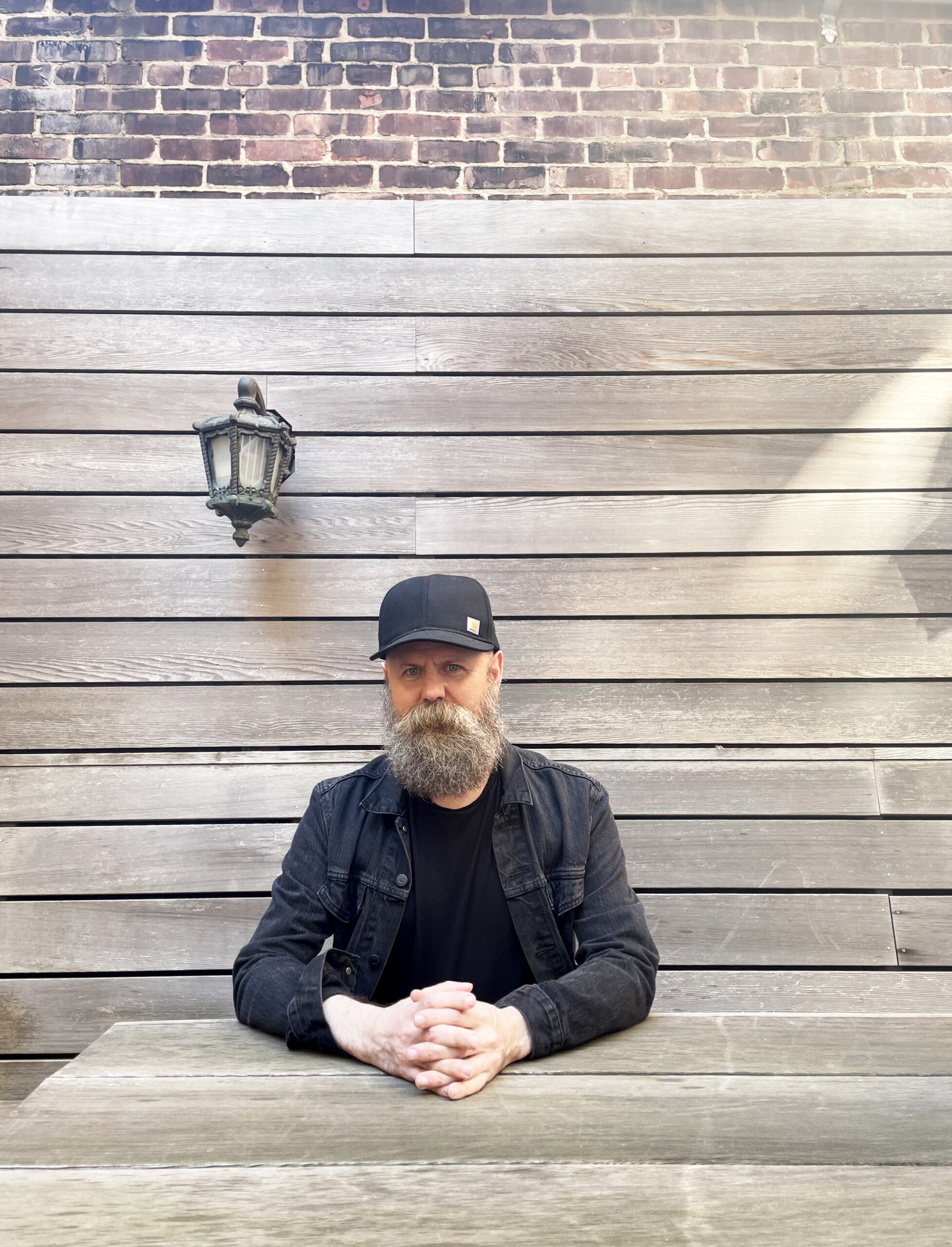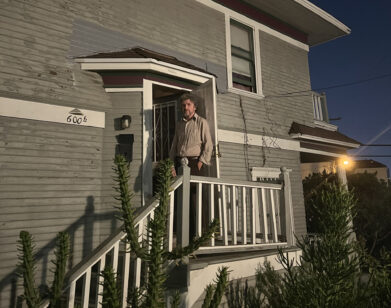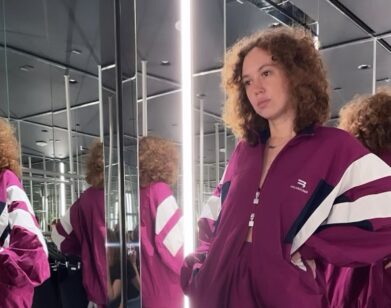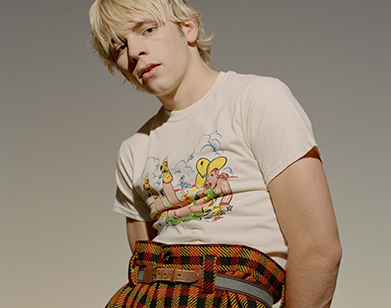HOLE
Author Nate Lippens on Trauma Narratives and Serial Killers
In his newest novel, Ripcord, Nate Lippens establishes Paul Lynde’s “snarling flamboyance” as a kind of apex. Throughout the book, he totally nails it. Lippens sets the tone, embittered and witty, from the very first line: “Some people get the glory. Some people get the glory hole.” And tone is everything. In Lippens’s new novel, just like in his 2021 debut, My Dead Book, the action is far away, a jumble of memories recurring through the lens of detachment. A fragmentary recollection of midwestern gay experience, My Dead Book opens with its narrator remembering an era of heroin and hustling, a time when Jeffrey Dahmer was on the loose. Ripcord, you could say, picks up where the first book leaves off, but with a bit more drift. Lippens did too many drugs for too long for these books to be autofiction, he says, but the narrator and author are at least from the same time and place, born in the 1970s in Wisconsin. “Faggotry” is his “passport,” a means of escaping the family predestination of factories and farms, though the period’s “rabid homophobia” nevertheless kept Lippens in a state of what he calls “abject poverty.” Both books are light on plot and heavy on burden. Working-class stories, rich in language if not much else. The one-liners feel somehow bleak and decadent at the same time: a shower curtain resembles a used condom, and West Texas is described as “psychedelic in its relentlessness.” My Dead Book was previously released only in the UK in 2021. But this time it’s a dual literary effort, with Pilot Press publishing the new novel for British readers and Semiotext(e) releasing both books in North America for the first time.
———
NATE LIPPENS: How are you doing?
WHITNEY MALLETT: I’m pretty good. I like all your books there.
LIPPENS: Oh, thank you. This is the one area of my apartment where there’s any light.
MALLETT: Perfect. I have to tell you that preparing for this, I watched so much Paul Lynde. I was talking about him on the subway yesterday to my friend like, “Do you know who Paul Lynde is?” Because honestly, before I read Ripcord I did not know. And then some guy interrupted us and was like, “You know, someone on Drag Race does a Paul Lynde tribute.”
LIPPENS: I love the subway interrupters. I think that was BenDeLaCreme or something. I’m glad you got to watch some Paul Lynde, though. Those old Hollywood Squares are so bizarre. That whole grid format is fascinating.
MALLETT: They were almost like what we now see as reality TV stars.
LIPPENS: Completely. There were people on Match Game too, like Brett Summers. Someone was once complaining to me about reality stars and I’m like, “We grew up with these people that weren’t on anything.” They were essentially TV personalities. I’m like, “How is that really much different?”
MALLETT: Yeah. I was trying to think of how to describe these novels for people that haven’t read them. Fragmentary novels?
LIPPENS: Yeah, absolutely. I think one time I called them queer misfortune cookies. They’re vignettes in first-person, set in the Midwest in Wisconsin, following this middle-aged gay man who’s pretty working class. And they move a lot in time between present and past. I always say fragments because people know what that means. For some people, that has a negative connotation, but to me it doesn’t.
MALLETT: I think that you have to be a really good writer to do it, and you are a really good writer.
LIPPENS: Thank you.
MALLETT: Because it is in the tradition of Paul Lynde. You have one-liners.
LIPPENS: Yeah, comedy has always been a huge influence for me. Since childhood, I would get Lily Tomlin and Richard Pryor records from the public library and listen to that stuff. It’s all about rhythm and timing and syntax, getting the most out of the words. So I think listening to comedy albums was a precursor to writing poetry for me, and poetry was the thing that made these novels possible.
MALLETT: I have to remind myself that they are novels because you put lots of your life in them, and it has a confessional quality in a way.
LIPPENS: Definitely. I love diaries. They’re not autofiction just because, to be really frank, I did way too many drugs when I was younger for me to possibly be able to remember accurately. And I think I just like making stuff up. I have since I was a kid. A little bit of life and then a whole lot of imagination makes it fun. A friend of mine, a visual artist, was saying, “You make the wire structure using a little bit of your own biography and then you papier-mache over the top.” That’s probably accurate as far as the process goes. I love first-person. I love really intimate writing, or at least the illusion of diary or memoir. But the novel frees you up. There’s no pressure at the end of it that I make sense of this narrator’s life or find a lesson. I can’t imagine writing a memoir and trying to make sense of my own existence at the end of it.
MALLETT: Then we have the contemporary thing, which you kind of play and refuse, of the trauma narrative.
LIPPENS: Oh god, yeah.
MALLETT: For me, you don’t give catharsis.
LIPPENS: That trauma can become such a Tupperware container for things. I always think of that Jamie Lee Curtis meme that’s a supercut where she just is saying “trauma” over and over in all these different scenes. Any moment where I start to move near something that feels like resolution or catharsis, I think of that. I just don’t want anyone to feel like it’s a queer trauma narrative or that all roads lead back to healing. I don’t think you have to heal to have a life. There’s something insulting about the idea that you’re permanently damaged by something in a way that completely keeps you from being able to have a full life. So I try to skirt around the trauma narrative as much as possible. I definitely flirt with it, but I don’t go home with it, I guess.
MALLETT: I was reading some of the interviews and reviews around the book when the UK version came out.
LIPPENS: That was a whole level of different publicity.
MALLETT: And it seemed like people were like, “Thank god it’s not just empowerment.” But I feel like people act like it’s binary. It either has to be empowerment or trauma.
LIPPENS: Right. I would never pretend that I have any idea what the truth of anything is, but it feels much more honest to me. People don’t want to fall into just being seen as a victim, but they also don’t want to have to be heroic. Certain symbols of empowerment are not my thing. The last Pride Parade I went to was in 2002. I think having a great, bitchy sense of humor is a kind of empowerment. Or even having skepticism can be very powerful. It’s definitely the way that people receive so-called queer literature right now, where it has to either have that heroic arc or the trauma narrative, which then has to have some sort of satisfying resolution or release. I’m always trying to dodge those.
MALLETT: My Dead Book starts with a teen hustler in the era of Jeffrey Dahmer.
LIPPENS: Yeah. It was before the latest iteration of Dahmer being part of public media again. It seems like every few years there’s something, but that was before. It was everywhere in the news when it happened, this insane and horrific thing.
MALLETT: Yeah, we’re in this Netflix-ication of serial killers, but it seems like the serial killer has disappeared in a way.
LIPPENS: I think so. So much of that was before the mass surveillance of things, so you didn’t have CCTV everywhere and phones that could be tracked. Not that things don’t still happen all the time now, but there was a way for someone to get away with it for years then. It’s harder for people to just vanish now. But I knew that I wanted to open My Dead Book with Milwaukee in that period of time.
MALLETT: I like a lot of the friendships of the boys cruising, hooking up, finding johns together.
LIPPENS: Yeah, that period that I’m writing about was right before My Own Private Idaho came out, which was a sort of milestone of queer cinema at the time. And it’s interesting knowing people who did sex work at that time, how movie representation has sort of bled into memory, which I find always fascinating, when you start to cinematize some of your own experiences. I was interested in playing with that self-mythologizing a bit, of being tough in situations that maybe you weren’t, or having the perfect comeback four years too late. I think we’re all kind of natural fiction writers in our recollections. When you have three people in a situation, it’s usually three different points of view, and nobody remembers the things being said in the way that they were.
MALLETT: Yeah. I wrote down “personal versus collective memory,” because I think you’re playing with this too.
LIPPENS: Definitely. The narrator’s voice is a combination of people that I’ve known. And there’s a melancholia, and a romance around that melancholy. He has that in his friendship with Rudy, and in Ripcord, he carries that over to his friendships with Greer and Charlie. I did want to capture a collective or choral voice between the two books, but it isn’t representative of an entire block of people or a generation. I’ve tried to detach it from that, even though it’s shaped by a specific period of time. I just find it funny when people fall into this journalistic construct of getting really caught up in Gen X or millennials. There’s so much overlap and cross-pollination. Like the guy on the subway. I don’t know how old he was, but somebody on the subway being like, “This was on RuPaul’s Drag Race,” that becomes this weird connective tissue to a period of time that previously would’ve been cordoned off generationally. That’s what’s great with video being available, anyone can trace things back, if they’re interested.
MALLETT: Yeah, it’s interesting. As a millennial, I think a lot of millennial novels feel like a Cut article, the way the characters are drawn. And I’m like, “Is that my generation?” But there’s this fight in every time period. Like, I was reading in the comments on Instagram the other day and someone was saying that people hated Dennis Cooper because they thought he was showing the worst of gay stereotypes.
LIPPENS: I remember that very much at the time.
MALLETT: Okay, so it’s not just my generation that’s so moralizing.
LIPPENS: No. People forget. These are just different terms for things we all know. Tradwife is a thing we all encountered then too, it just didn’t have a Cut article. There weren’t clicks to chase with those things. But stuff has always been moving in and out. It’s not like a resurgence of Christian writers is something new. It just now becomes a story in the New Yorker and that kind of forms a thing.
MALLETT: Yeah.
LIPPENS: I remember so much around the word queer at the time, which was politicized in the way that it was attached to Queer Nation and who used it. I remember using it and gay men my age and older hating it. I mean, hating it. So it’s interesting that there’s still fights around these weird taxonomies about identities. I have friends that are in their seventies and eighties, and friends in their twenties and thirties, and I think most of the underlying concerns are pretty much the same. We just get caught up in whatever the differences are. No one I know is buying a giant mansion anytime soon. I spoke with a friend recently who was applying for some job online and it was an endless fill-in type of thing. And he was like, “I really miss just going in and being charming at the interview and getting the job.” He’s back in the job market in a way he hasn’t been. And I was like, “Talk to anyone in their thirties and they’ll tell you this is what the process looks like now. It’s not just showing up and being charming.”
MALLETT: I kept thinking about one vignette of this old queen who’s playing TVs in every room, and another one that shows a moment similar to our post-internet cutting up media. And I thought, “People have always experienced media in these kinds of ways.”
LIPPENS: Absolutely. I was talking to you earlier about the fragment novel, and there have been articles and essays about the limitations of the fragments and people being like, “It’s part of social media.” To me, it’s part of zines. It’s part of a whole generation that was tearing magazine pictures out of The Face and Interview, and that’s what your bedroom was covered in. There’s a whole history of collage, it’s just that the technology changes, and people think to sell the technology you have to pretend it’s something new when usually it’s some recombination of things. And seeing the Copy Machine Manifestos of all the ’80s and ’90s zines [to today], it goes from this almost punk ransom note type of layout into a different [layout] of people satirizing pieces of pop culture on TikTok or YouTube or Twitch. The sensibility behind those zines has moved on, and the ideas and some of the humor really lends itself to other mediums.
MALLETT: And when I think about the way I experience your books, they’re linear, but I almost think they’re frames within frames. Existentialism has existed for a long time and people have always recognized themselves within a disintegration.
LIPPENS: Certainly, there’s always a natural tendency. People have always had that as a baseline, especially in times where people are really struggling just to survive. I think there’s something comforting in that kind of existentialism because it is, in a way, just an old tradition at this point. It’s familiar and maybe doesn’t feel as personally despairing or bereft. I knew in both books that I wanted to have definite moments of that struggle that the narrator is dealing with of just being alive.
MALLETT: It’s great. There’s a lot of tension. There’ll be a moment that might veer into sentimentalism, but then it has this wit or this gallows humor. I saw it as these people being too insignificant for anyone to actually want to destroy.
LIPPENS: Right. No one was going to destroy us because we didn’t matter. And I think that a lot of times the truth of things is romanticized, but when you talk to people you realize, “They didn’t see themselves as part of something big. They were just living their lives.” When I was growing up in the Midwest, downtown New York seemed so incredibly significant. I would go to the public library and read the Village Voice and Gary Indiana and C. Carr and Laurie Stone and it just felt so alive and vibrant, and I felt exiled in the middle of nowhere. There’s a romantic way of looking at that period of time that is very dishonest. Gary Indiana has written about it. People are erasing parts of how hard it was, obviously with the AIDS crisis, and also the way the city just kept changing. By 1982, all these things had changed. I remember getting to New York in 1987, at 16, and seeing some performance piece at PS 122, and it was a whole rant about gentrification. So I was like, “Oh, I’m too late.” We all sort of think, “I was too late for this thing.” You don’t look around at your own peer group and realize, “These are actually the people. This is our moment that someone else might think was significant.”
MALLETT: It’s exhausting either way. The people who come down from the rafters like, “You should have been here 10 years ago,” and the people who are like, “Aren’t we so fabulous?” They’re equally nauseating.
LIPPENS: Yeah. I was talking to a younger writer a while ago, and it was so fascinating because he really was like, “I have something to say because I’m special.” So much of the way I write is expecting someone’s going to jump if I give them a reason. Keep it interesting and snappy because they’re going to go. Often, the people I’m closest to in my life aren’t that excited to hear what I have to say, so I can’t imagine thinking there’s a public out there just dying to hear it. It’s a complete shift in mentality for me. I thought, “I have absolutely none of this.”
MALLETT: Well, you said you don’t take for granted anyone’s attention in your writing. Your writing is exacting. It’s funny. It’s uncompromising. There’s certain sentences where a word slips in that surprises me, and I love that feeling.
LIPPENS: Thank you. I think some of that comes from reading a lot of poetry where I’ll want there to be something that kind of realigns the sentence. And some of it comes from comedy and that misdirection where a joke starts one place and lands somewhere else. To take that energy to a non-comedic sentence is always interesting to me. It’s sort of delivered like a punch line, even though it’s not funny. Books are so short now, too. There is an existentialism. My Dead Book has AIDS in it, and there’s sort of this weird suicidal ideation that trickles through all of it, so I thought, “I want people to be able to read this in a day or two.” It just feels like, especially with something fragmented, it could be the kind of thing that you set down and not come back to.
MALLETT: So you don’t have a cliffhanger.
LIPPENS: Right. Because you’re not working by plot, it has to have some other tension that’s happening through the juxtaposition of the different sections so that people want to continue to read it and find out. I guess I value people’s time that way. I really want them to be engaged.
MALLETT: Yeah, it’s very immersive. I did read each book in a day or two. And even looking at the page and seeing large chunks of white space and a lot of asterisks, it has this blankness visually that matches the formal quality.
LIPPENS: I want to leave enough space that the reader can project all kinds of things into it and have their own interpretation. It’s why when it first came out, I had to quickly disengage from any sort of ego around it and be like, “If people think it’s a memoir, it’s fine.” It’s more about them having an experience with the book. I don’t need to be caught up in the idea of the artistry behind it. And I think the spaces and the asterisks and the smaller sections help to do that. I did number all the chapters, and numbers really do create order in people’s minds. It’s like having a to-do list. It creates something sort of linear.
MALLETT: I feel like you have such a pessimistic persona in these books, but are you looking forward to your book tour?
LIPPENS: I am. I’m really excited. When My Dead Book came out, it was during the pandemic. I remember doing the Pilot Press launch, and it was me and Olivia Lang on my screen, which was like, “Wow.” And then it was over and I just closed the computer. That was the book launch. It was very strange. I get nervous in front of people, but I see myself less as a person in those situations and more like an emissary for the book. I want to be the best representative for the book and not be so self-conscious. So I think I’m going to enjoy it this time. And because I didn’t get to do a lot of that before, it feels like a mini victory lap.
MALLETT: When are you coming to New York?
LIPPENS: I am there on the 25th at Topos Too with Kate Zambreno. It’s going to be fun.




